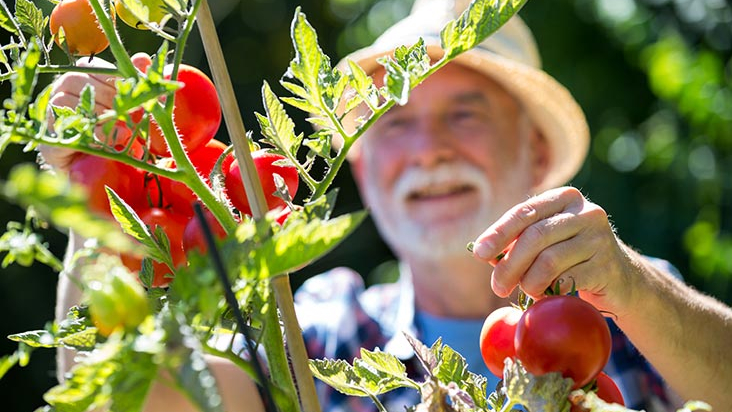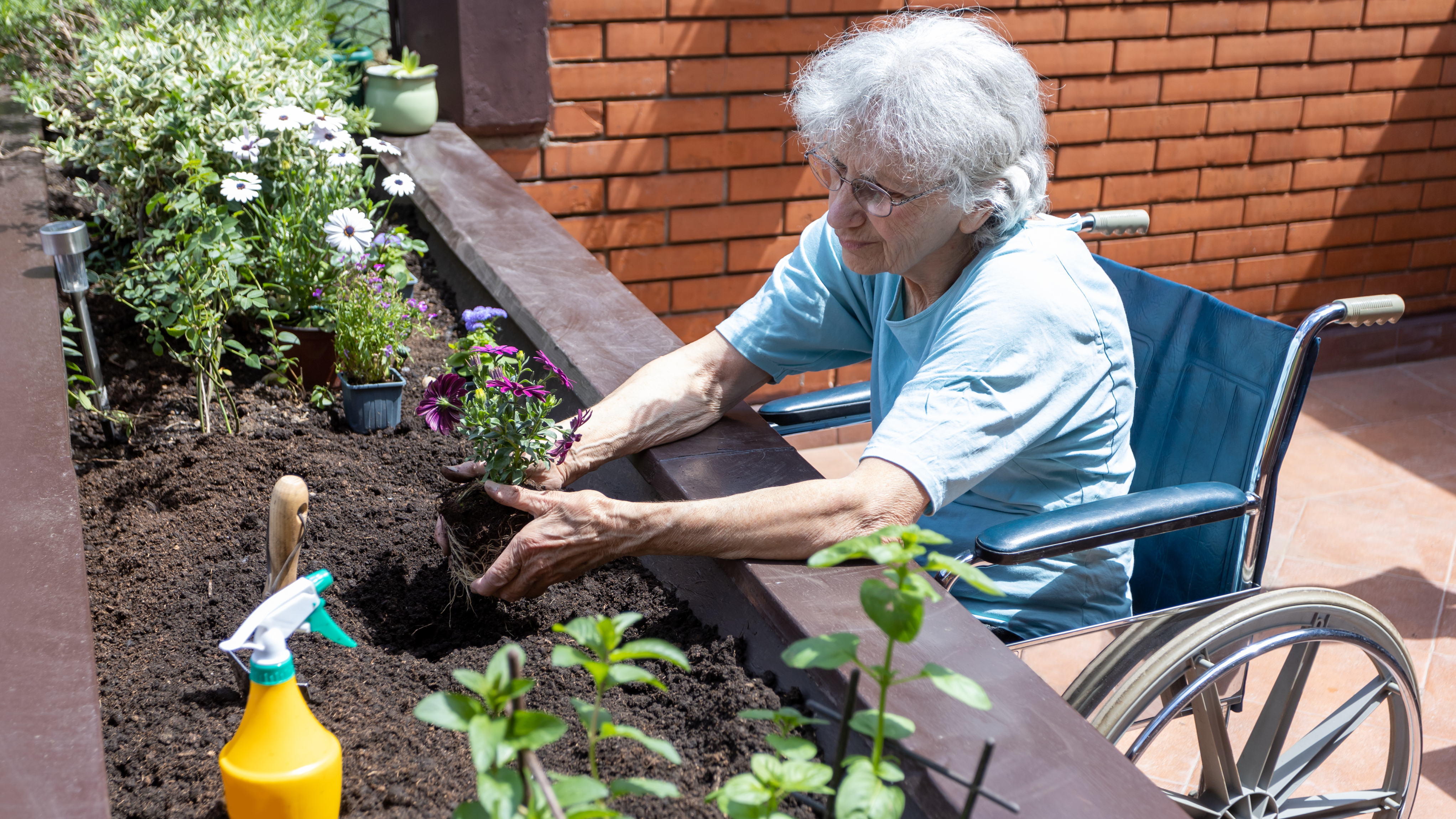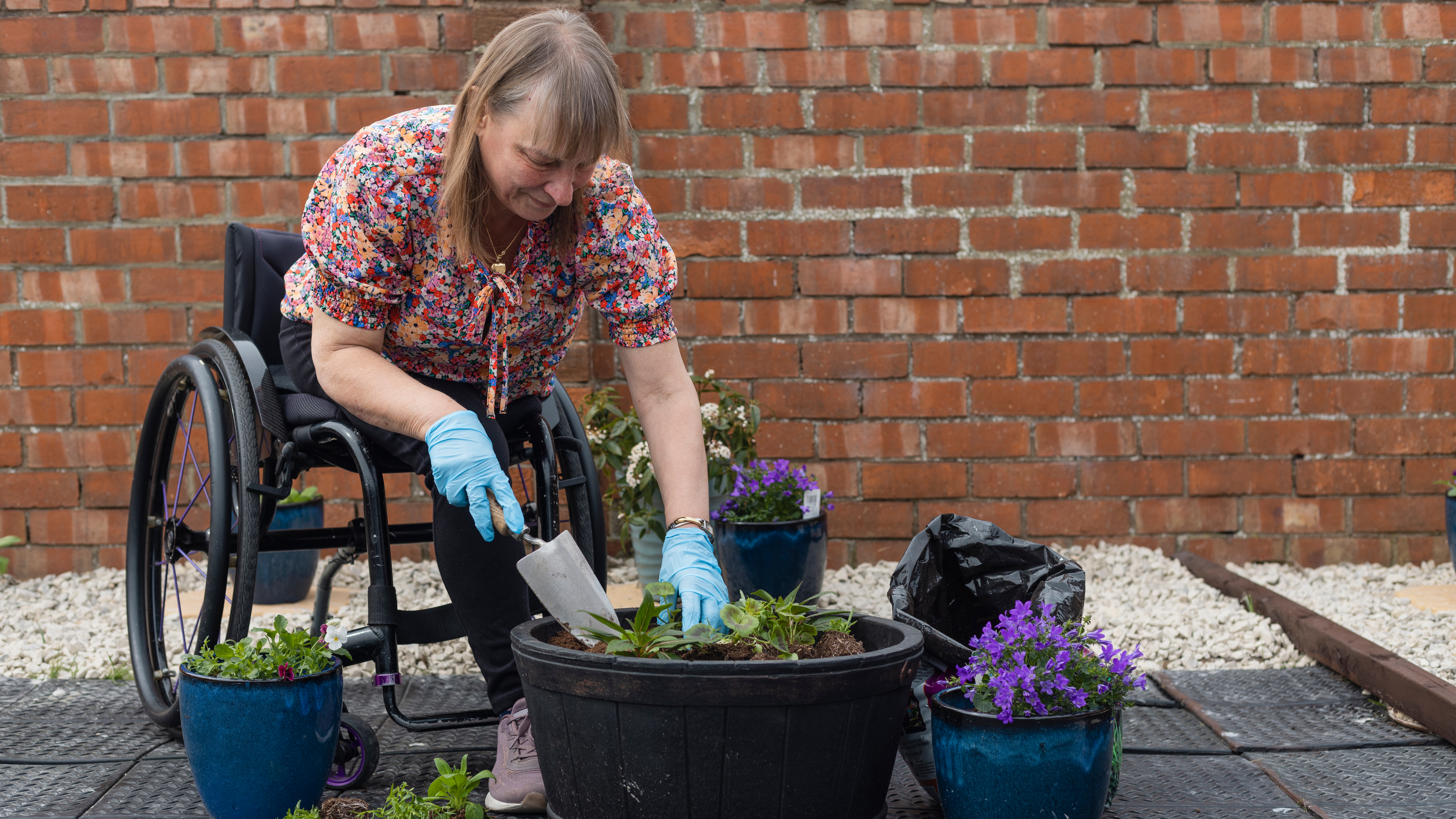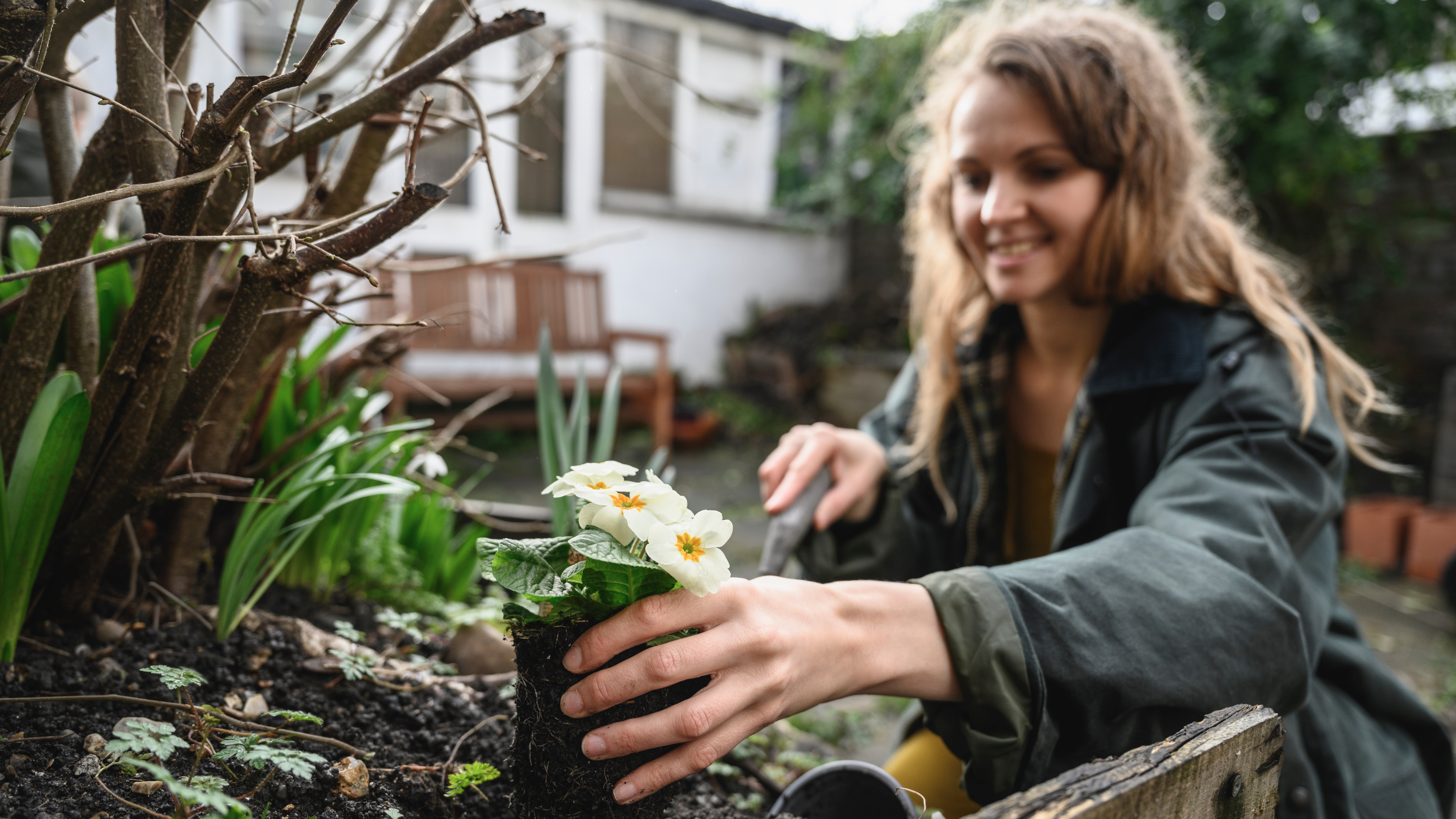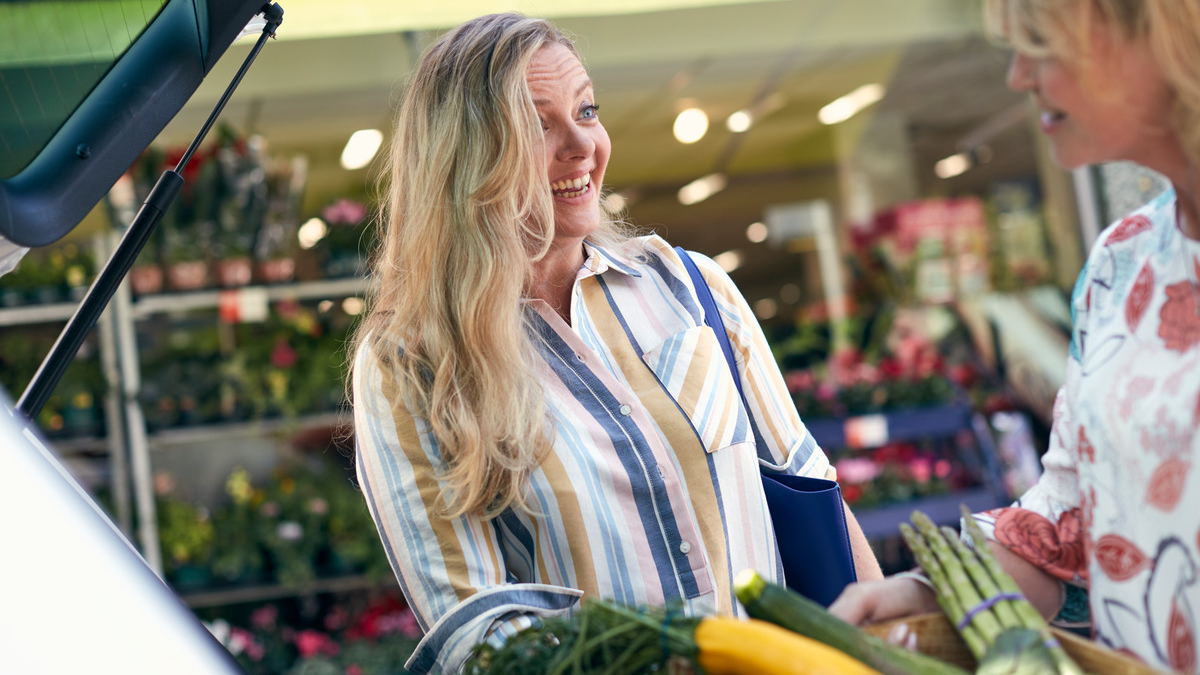Gardening can be a fun, fulfilling and accessible hobby. It can be great for your mental health, physical wellbeing, and overall quality of life.
Gardening offers more than just pretty plants. It can be a meaningful and empowering activity that boosts confidence, encourages creativity, and brings a sense of purpose. Whether you’re nurturing a balcony herb pot or transforming your backyard into a haven, gardening gives you a chance to connect with nature on your own terms.
Here are our tips for starting and enjoying your gardening.
- Why gardening can be a happy hobby
- Making gardening more accessible makes it more enjoyable
- How to get started
- Gardening when you do not have access to a garden
- Other places you can find support
- Get gardening, with your Scheme vehicle
Why gardening can be a happy hobby
Gardening can be a relaxing hobby you can find a lot of joy in. It offers you a safe space to explore your creative side, and there are lots of tips and tools that can make it accessible. In this article we look at some of the benefits to gardening with a disability and how to get into it, regardless of the type of garden you have access to.
It can Improve your mental health
Interestingly, studies have shown that gardening not only eases depression but also improves self-esteem.
In fact, when Gardener’s World magazine interviewed 1500 gardeners, 80% of them said they’re happy.
Lots of gardening activities, like planting your bulbs and watching them grow, can be calming and cathartic. For lots of people, it really helps them relax, in a similar way to practicing mindfulness. That’s because you need to focus and be in the moment.
BBC Gardener’s World presenter Monty Don, who has spoken publicly about his struggles with depression, has found gardening very soothing:
“Earth heals. You put your hands in the soil and it’s medicine. You’re recharging, topping up, being looked after and you’re looking after the earth.”
It can improve your physical health
Gardening is a great way to do some gentle exercise. It helps your motor skills and physical health. Simple garden tasks can elevate your heart rate and keep your body active, which supports heart health. Connecting with nature can also help reduce stress levels. And being outside in the fresh air is known to help improve sleep quality.
Sharing the joy of gardening can give you a sense of community
Gardening alone has its benefits, but it’s even more fun to garden with others. This could mean visiting a garden allotment in your Scheme vehicle and chatting to the other lot owners and sharing seeds and stories. Or you could share a cosy Sunday gardening session in the back garden with your family.
Thrive is a charity that uses gardening to bring about positive changes in the lives of people living with disabilities or ill health, or who are isolated, disadvantaged or vulnerable. It sets out to promote the healing powers of gardening.
Making gardening more accessible makes it more enjoyable
With the right tools, gardening is more accessible and inclusive than ever. Here are some of the ways you can make your garden more accessible and more enjoyable.
Wheelchair accessible garden beds
There are garden beds that have been designed so you can get close to your plants while you’re in your wheelchair. They’re usually U-shaped or L-shaped, so you can move your wheelchair into the middle of your flower beds.
Raised beds and vertical gardens
Getty Images / EyeEm Mobile GmbH ©
Raised beds sit higher above the ground than usual beds, to save you bending down too far. A vertical garden is a green or living wall where you add plants and care for them. Since it’s upright, it saves space and makes it far simpler to tend your garden at a height that suits you. And they can be stunning to look at.
Container gardening
Getty Images / SolStock ©
You can grow lots of plant types in containers, instead of directly in the ground. This can be useful, as you can place them on windowsills, walls, or wherever’s easy for you to reach. They come in different shapes and sizes. Try using a plastic, terracotta or wooden pot. Or have fun and get creative by using an old bucket, tin or even bin.
Adapted tools and equipment
Just like our car adaptations on the Scheme, you can get adapted tools for gardening too. These make it easier or possible to look after your plants. They’re things like a trowel with built-in arm support, and tools that extend, to save you overreaching.
Seating and accessible garden furniture can help
After all your hard work’s done, you deserve to sit down and enjoy your garden in comfort.
You can buy seats designed to make you feel more comfortable and give you the right support to stay outdoors longer.
One example is a garden rocking chair, so you can have a relaxing gardening experience. You can also buy benches with the middle of the seat cut out, so a wheelchair can get up close. Or a circular bench with four single chairs, so there’s plenty of room to move.
How to get started
If you decide to take up gardening, think about what sort of garden you want to create. Maybe you like what you already have and want to maintain it, or maybe you want a change? There’s so much satisfaction in creating something new and fresh.
Low-maintenance plants are best for all weathers, as you might not always be able to get outside and care for them. You can also get sensory-friendly plants. These can be scented, textured, and visually appealing. They’ll help you put a nice personal touch on your garden.
Need some inspiration? Read how gardening helped Scheme customer Mark Lane with his wellbeing.
You’ll be surprised how much you can grow
The most common planting seasons are spring and autumn. However, depending on the type of garden you want, you can plant your garden throughout the year. Spring is the time to sow seeds for plants such as sunflowers, so they come up in time for summer and give your garden a burst of colour. To ease yourself into this hobby and keep things low maintenance, you could go for tubs and shrubs instead of flower beds.
Or maybe your idea of gardening is less about flowers and more about produce. Spring is a good time to plant potatoes, which grow in most soils and climates. You can also grow other vegetables such as carrots, radishes, tomatoes and onions and have yourself a full-blown allotment in no time.
This can be very rewarding. And what could be nicer than eating food you’ve grown yourself?
Getty Images / JohnnyGreig ©
Gardening when you do not have access to a garden
If you live in a flat or sheltered housing and do not have access to your own garden, you can still enjoy this hobby. You could cultivate a window box, tubs for your balcony, hanging baskets, or even get an allotment. The National Allotment Society has lots of advice on how to join a waiting list for an allotment in your local area and apply to make a new allotment space.
Join a gardening club
There are gardening clubs all over the country. And they’re not just for seasoned, green-fingered growers. So, as well as an enjoyable and useful hobby, you could make new like-minded friends and learn all sorts of useful information from experts, like what kind of soil works best for different plants and flowers. You can find your nearest gardening club on the RHS website.
Other places you can find support
Here are some useful websites that help you plan, manage, and even fund your garden:
- The Royal Horticultural Society has tips on how to attract of ward off bugs, news about garden events and more
- The Gardening with Disabilities Trust aims to get disabled people get back into gardening, and gives out grants to make gardening possible
- Royal Institute for the Blind has information and guidance for gardeners who have lost their sight
Get gardening, with your Scheme vehicle
Now you know how to get started, there’s nothing stopping you. Just remember to start small and gradually work your way up to bigger activities.
We’ll help you enjoy your hobby too. You can explore different gardens, allotments, and shows in your Scheme vehicle. A vibrant garden can make a pretty and picturesque day out.
Motability Scheme customer Sandra says she’s hardly ever home because she makes good use of her vehicle to enjoy her gardening hobby:
I go in my Scheme car and it’s like the Day of the Triffids! I’ve got radishes, onions, four or five different types of tomatoes. I don’t think there’s anything we haven’t got.
Interested in joining the Scheme?
If you receive a qualifying mobility allowance you can use it to lease a vehicle, Wheelchair Accessible Vehicle (WAV), scooter or powered wheelchair on the Motability Scheme. You’ll get a brand-new vehicle and our all-inclusive package.
We cover your insurance, servicing, maintenance and breakdown. And we’ll support you with charging, if you get an electric vehicle.
Get more information.
Related articles
Shops, supermarkets and sports clubs with sensory spaces
Six great reasons to attend Motability Scheme Live
![]()

